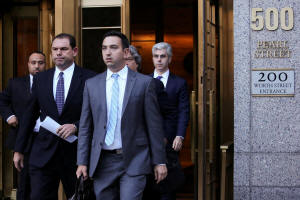Cuomo-era New York corruption cases go before U.S. Supreme Court
 Send a link to a friend
Send a link to a friend
 [November 28, 2022]
By Nate Raymond and Andrew Chung [November 28, 2022]
By Nate Raymond and Andrew Chung
WASHINGTON (Reuters) - The U.S. Supreme Court on Monday is set to
consider bids by an ex-aide to Democratic former New York Governor
Andrew Cuomo and a businessman to overturn their bribery and fraud
convictions in a pair of cases that could make it harder to pursue
public corruption prosecutions.
The justices are scheduled to hear arguments in appeals by Joseph
Percoco and Louis Ciminelli, who were charged in related cases in 2016
in a corruption crackdown by federal prosecutors in Manhattan centered
on the halls of the state capital of Albany.
The Supreme Court's eventual rulings, expected by the end of June, also
will affect three co-defendants charged in corruption and fraud cases
during Cuomo's tenure as governor involving state contracts worth
hundreds of millions of dollars.
The Supreme Court in recent years has limited the latitude of
prosecutors in political corruption cases. In 2020, it threw out the
convictions of two aides to former New Jersey Governor Chris Christie
who were at the center of the "Bridgegate" political scandal. In 2016,
it threw out Republican former Virginia Governor Robert McDonnell's
bribery conviction in another ruling restricting the types of conduct
that can warrant prosecution as corrupt.

The charges against Percoco and Ciminelli were brought in 2016 by former
Manhattan U.S. Attorney Preet Bharara, who also pursued corruption cases
against top state lawmakers including former Assembly Speaker Sheldon
Silver.
While Cuomo was never charged in the investigation, the case Bharara
unveiled in 2016 cast a pall over his administration. Cuomo resigned as
governor in 2021 in an unrelated sexual harassment scandal.
Percoco, a former Cuomo aide, was convicted in 2018 on bribery-related
charges for seeking $315,000 in bribes in exchange for helping two
corporate clients of an Albany lobbyist named Todd Howe seeking state
benefits and business.
Percoco was sentenced in 2018 to six years in prison. Howe pleaded
guilty and cooperated with investigators. Real estate developer Steven
Aiello, who prosecutors said orchestrated bribes to Percoco, was also
convicted at trial.
[to top of second column]
|

Joseph Percoco (L), former aid to New
York Governor Andrew M. Cuomo, walks out of the Manhattan Federal
Courthouse in New York, September 22, 2016. REUTERS/Bria Webb

At the time of the alleged offense, Percoco was no longer serving in
government as the governor's executive deputy secretary but managing
Cuomo's 2014 re-election campaign, a fact his lawyers said meant he
could not be convicted of bribery.
His lawyers argue that Percoco's status as a private citizen meant
that his acceptance of money to convince the government to do
something indicated he was not a criminal but a lobbyist, and that
allowing his conviction to stand would expose the profession of
lobbying more broadly to criminal charges.
The New York-based 2nd U.S. Circuit Court of Appeals in 2021 upheld
his conviction, finding that Percoco had a guaranteed job in Cuomo's
administration post-election and in the interim exercised enough
influence over government decision-making to owe a duty to the
public.
Ciminelli's case focused on Howe's role as a consultant hired to
help administer Cuomo's $1 billion revitalization initiative for the
Buffalo, New York area.
Prosecutors said executives at two companies including Ciminelli,
who owned a construction firm, conspired with Howe and Alain
Kaloyeros, who oversaw the project's grant application process, to
rig bids to ensure contracts went to their firms.
Ciminelli was convicted at trial alongside Kaloyeros, the former
president of State University of New York's Polytechnic Institute,
and developers Joseph Gerardi and Aiello. They also have asked the
Supreme Court to reverse their convictions.

Ciminelli was sentenced to two years and four months in prison. A
trial judge in July allowed him to be released from prison on bail
after the Supreme Court agreed to hear the case.
(Reporting by Nate Raymond in Boston and Andrew Chung in Washington)
[© 2022 Thomson Reuters. All rights
reserved.]
This material may not be published,
broadcast, rewritten or redistributed.
Thompson Reuters is solely responsible for this content. |